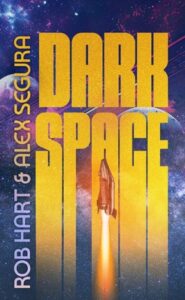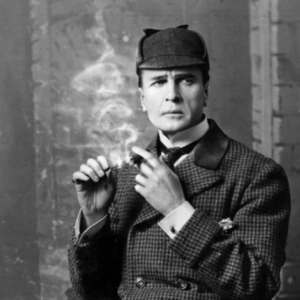Mashing genres can be a tricky business. Do it right, and you’ve created a short story, book or movie that remixes those respective genres’ elements in new and exciting ways—for instance, Philip K. Dick memorably using a detective narrative to explore the post-apocalyptic setting of “Do Androids Dream of Electric Sheep?”
But if you mess up, the results can be disastrous. Precious few people probably want to revisit “Bright,” the 2017 Will Smith movie that collided high fantasy and gritty cop drama with the subtlety and nuance of two 18-wheelers crashing together at highway speeds. Mishandle the genres’ beloved aspects and you risk alienating multiple groups of fans simultaneously.
When Rob Hart and Alex Segura sat down to write “Dark Space,” which combines a “Star Trek”-style space opera with a John le Carré-infused spy story, they faced exactly that sort of challenge. Fortunately, they both have deep experience in writing multiple genres—in addition to his crime-fiction work, Hart has written two speculative-fiction novels (“The Paradox Hotel” and “The Warehouse”), while Segura is the award-winning writer of multiple novels and comic books.
“Dark Space” weaves two narratives together. One takes place aboard the Mosaic, a huge interstellar ship that begins experiencing mysterious, potentially catastrophic issues; its pilot, Carriles, becomes increasingly suspicious about the true cause of those problems. The other is set on an off-world settlement where a burned-out spy, Timony, finds herself sinking into a deadly conspiracy. The two are connected, of course, and ultimately personal for both Carriles and Timony as they fight to stay alive.
Here’s Hart and Segura breaking down the origins of “Dark Space,” their thoughts on contemporary spy and speculative-fiction narratives, and much more.
Q: What’s the origin story behind this novel? What led you to join forces to write a novel that mashes up spy fiction with speculative fiction?
ALEX SEGURA: I’d always wanted to write a sci-fi novel, that’s the short version. I grew up on “Star Wars” and “Star Trek,” in addition to classic sci-fi like Asimov and Bradbury. But I was fascinated with the idea of building a universe that could sustain a long series of books. I also love spy and espionage stories, particularly le Carré’s Smiley novels, so I started wondering if there was a way to blend the two genres to create something that felt new but also familiar. Workload-wise, I knew I wouldn’t be able to get to it for a while, but I am also impatient and stubborn. That’s when I texted Rob!
ROB HART: Alex texted me something like “hey I’ve got this idea for a sci-fi novel, want to jam on it together?” It was an easy yes. We’ve worked on things together before and our styles and personality mesh really well. And it was just a really awesome idea.
Q: Your influences for this project included “Star Trek” and some Golden Age speculative-fiction writers like Bradbury. Many of those writers had an optimistic view on the future of technology and humanity.
But you’re also blending in a lot of spy-fiction elements here, and many of those writers—such as le Carré—take a cynical approach to humanity and morality. When you two were writing, did you ever find the speculative-fiction elements in philosophical tension with the spy elements?
RH: That’s a really great question—I hadn’t thought of it like that! I think those two things can be in conflict, but also complementary. No one’s putting their life on the line for anything unless, deep down, they dream of something better. But I do think there was a lot of cynicism that I wanted to cut through, because I think this kind of story, and sci-fi in general, is very good at doing that.
AS: I wouldn’t say they were in conflict—I think that conflict made it all feel more real, you know? It’s very relevant. I try to stay positive and optimistic today despite the terrors I experience while reading the news. I think you have to strive to have a basic belief in the goodness of humanity, even if we’re being bombarded by examples of how bad things are. It makes the good stand out, when you reflect to readers a dark, complicated world that feels a bit bleak.
Q: You do quite a bit of world-building here, both in passing (melted glaciers on Earth, off-world colonies not doing too well, lack of wood, China/U.S. tensions in space) and overt (how the ship can communicate quickly with people back in our home solar system). How did you approach designing your universe? Did you create a “story Bible” or similar document filled with details the reader doesn’t even see?
AS: A lot of the time, early on, for us was spent world-building. I think the main Google doc we worked from was close to 100 pages long, and none of that had “story” per se—it was characters, text on the government structure, how space travel works, the infrastructure of society… once we had all that firmed up, we felt ready to think about what the most interesting story would be to tell in that world, but I don’t think we could’ve written the book if we hadn’t spent so much time crafting the world and having it feel wondrous but also realistic.
RH: That Google doc is humongous and I’m glad we had it. I think Alex and I had complimentary skillsets. I focused on a lot of the science stuff, while he did a lot more of the political stuff. I feel like this book, if either of us had tackled it solo, would have taken twice as long. But in a lot of ways we were able to divide and conquer and build a really strong roadmap.
Q: You’re both fans of spy stories. At first glance, as a genre, spy thrillers still seem largely beholden to tropes and themes that began during the Cold War—nuke threats, secret lairs, triple agents, etc. Of course, we are well past that era and a new generation of writers always tries to shake things up. How do you think the spy genre is evolving?
AS: I think, for me, the best spy novels explore the shadows—the gray areas where morality and politics kind of disappear. I think the best spy novels I’ve read of late lean into that and present readers with complicated characters who are forced to continually make tough choices in the name of what’s right, to the point of having to question whether there is “right” anymore. I do think you’re right—a lot of the big tropes of the Cold War are gone, but I think that, unfortunately, there are plenty more plot threads that are extremely timely and frightening to pull from. If you like “Dark Space,” I’d suggest picking up Alma Katsu’s “Vanishing Man” stories or Paul Vidich’s spy novels. Those are the modern spy writers I really dig these days.
RH: I think, like most genres, the spy genre was once relegated to older white guys, and it’s opening and expanding beyond that, which is part of what made this fun to write. It was exciting that our tough-as-nails jaded spy was a woman, and Alex mentioned Alma Katsu, who is a brilliant writer and a former intelligence officer—she wasn’t just an inspiration because of the books she writes, but also because, yeah, not every spy has to look and act like James Bond or George Smiley.
Q: Flipping to the speculative-fiction side of things: there’s a ton of space/planet settlement fiction out there, much of it trying to pay homage to the classics of the genre. As you started the book, how did you consciously work to differentiate it from anything else out there? It definitely feels different from a lot of space fiction I’ve read and seen lately.
RH: I’m a science nerd, and whenever I see some weird scientific theory or discovery I always wonder how I can work it into a story. So, for me it’s about accumulating those things and figuring out how to make them work. But at the same time, I want them to be fun and understandable and work in the context of the story.
AS: This is a testament to Rob’s obsession with scientific accuracy, but I think we really wanted to have everything feel more grounded but also not lose the wonder of, say, warp travel or things like that. We did our share of hand-waving and techno-speak, but I think we also did a decent job of grounding the science fiction in some fact. The same goes for the world building—we tried to make the reality of “Dark Space” feel rooted to the reality we are experiencing now, in the hopes that it would feel more relatable and concrete to the reader. Hopefully we succeeded!


















